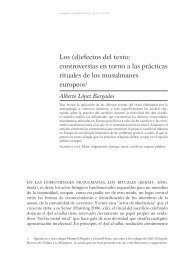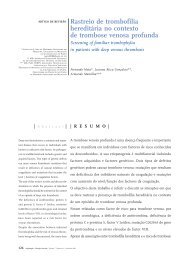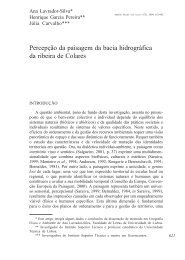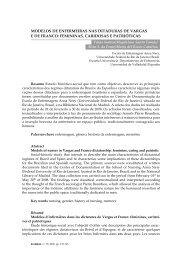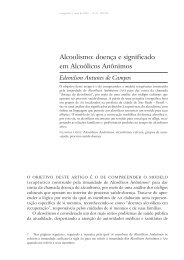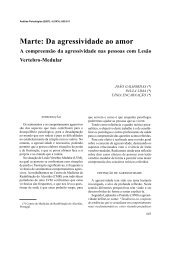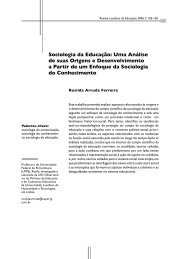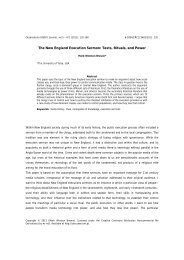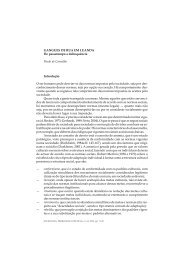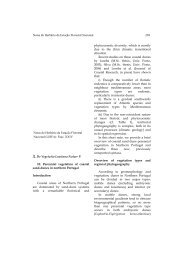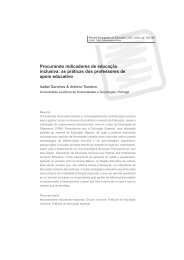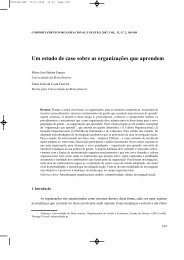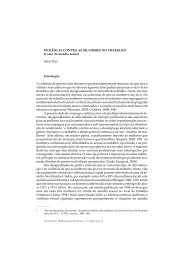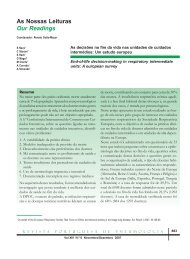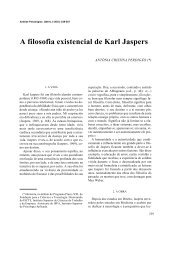NOVAS FORMAS DE ORGANIZAÇÃO DO TRABALHO E ... - SciELO
NOVAS FORMAS DE ORGANIZAÇÃO DO TRABALHO E ... - SciELO
NOVAS FORMAS DE ORGANIZAÇÃO DO TRABALHO E ... - SciELO
You also want an ePaper? Increase the reach of your titles
YUMPU automatically turns print PDFs into web optimized ePapers that Google loves.
62 Ilona Kovács<br />
Lawler, III, Edward (1982), “Increasing worker involvement to enchance organizational<br />
efectiveness”, em P. Goodman (org.), Changes in Organizations, San Francisco,<br />
Jossey-Bass.<br />
Lehner, Franz (1992), Anthropocentric Production Systems: The European Response to<br />
Advanced Manufacturing and Globalization, Bruxelas, CEC, DGXII-Monitor/FAST.<br />
Linhart, Danièle (2002), “Los assalariados y la mundialización: El caso Francés”,<br />
Sociologia del Trabajo, 45, pp. 53-68.<br />
Lorenz, Edward, Bengt-Aake Lundwall, e Antoine Valeyre (2004), “The diffusion of work<br />
new forms of work organization and worker outcomes: lessons from the European<br />
case”, 2.º Globelics International Conference: Innovation Systems and Development:<br />
Emerging Opportunities and Challenges, Beijing, China.<br />
Méda, Dominique (1995), Le Travail, une Valeur en Voie de Disaprition, Paris, Alto Aubier.<br />
Merlié, D., e P. Paoli (2001), Third European Survey on Working Conditions (2000),<br />
Luxemburgo, Office for Oficial Publications of the European Community.<br />
Moniz, A. Brandão, e Ilona Kovács (1997), Evolução das Qualificações e das Estruturas de<br />
Formação, Lisboa, IEFP.<br />
Mumford, E. (1994), “New treatments or old remedies: Is business process reengineering<br />
really socio-technical design”, Journal of Strategic Information Systems, 3 (4),<br />
pp. 313-326.<br />
Nevell, Sue, e Robert Galliers (1999), “Business Process Reengenheering: Explaining why<br />
BPR has diffused widely despite concerns about its effectiveness”, Comportamento<br />
Organizacional e Gestão, 2.<br />
Noble, David F. (1995), Progress Without People: New Technology, Unemployment, and the<br />
Message of Resistance, Toronto, Between the Lines.<br />
Oeij, R. A. Peter, e M. Wiezer Noortje (2002), New Work Organization, Working Conditions<br />
and Quality of Work: Towards the Flexible Firm?, Luxemburgo, European Foundation<br />
for the Improvement of Living and Working Conditions, Office for Official<br />
Publications of the European Commission.<br />
Osterman, Paul (2000), “Work reorganization in an era of reestructuring: trends in<br />
diffusion and effects on employee welfare”, Industrial and Labor Relations Review, 53<br />
(2), pp. 179-196.<br />
Petrella, Riccardo (1994), “As armadilhas da economia de mercado para a formação no<br />
futuro: para além do anúncio, a necessidade da denúncia”, Formação Profissional, 3.<br />
Ramsay, Harvie, Dora Scholarios, e Bill Harley (2000), “Employees and<br />
high-performance work systems, testing inside the black box”, British Journal of<br />
Industrial Relations, 38 (4), pp. 501-531.<br />
Reich, Robert (1993), O Trabalho das Nações, Lisboa, Ed. Quetzal.<br />
Rifkin, Jeremy (1995), The End of Work: The Decline of the Global Labor Force and the New<br />
Post-Market Era, Nova Iorque, Jeremy P. Tacher; P. Putnam’s Sons.<br />
Rosenfield, Cinara (2002), “Autonomia outorgada e resistência: a relação do trabalhador<br />
industrial com seu trabalho”, SOCIUS Working Papers, 6, Lisboa, ISEG/UTL. URL:<br />
http: //pascal. iseg. utl. pt/~socius/wp/wp502. pdf<br />
Savage, Pat (2001), New Forms of Work Organization: The Benefits and Impact on<br />
Performance. URL: http: //europa. eu.<br />
int/comm/employment_social/labour_law/docs/wonewformsofwo_en. pdf<br />
SOCIOLOGIA, PROBLEMAS E PRÁTICAS, n.º 52, 2006, pp. 41-65



